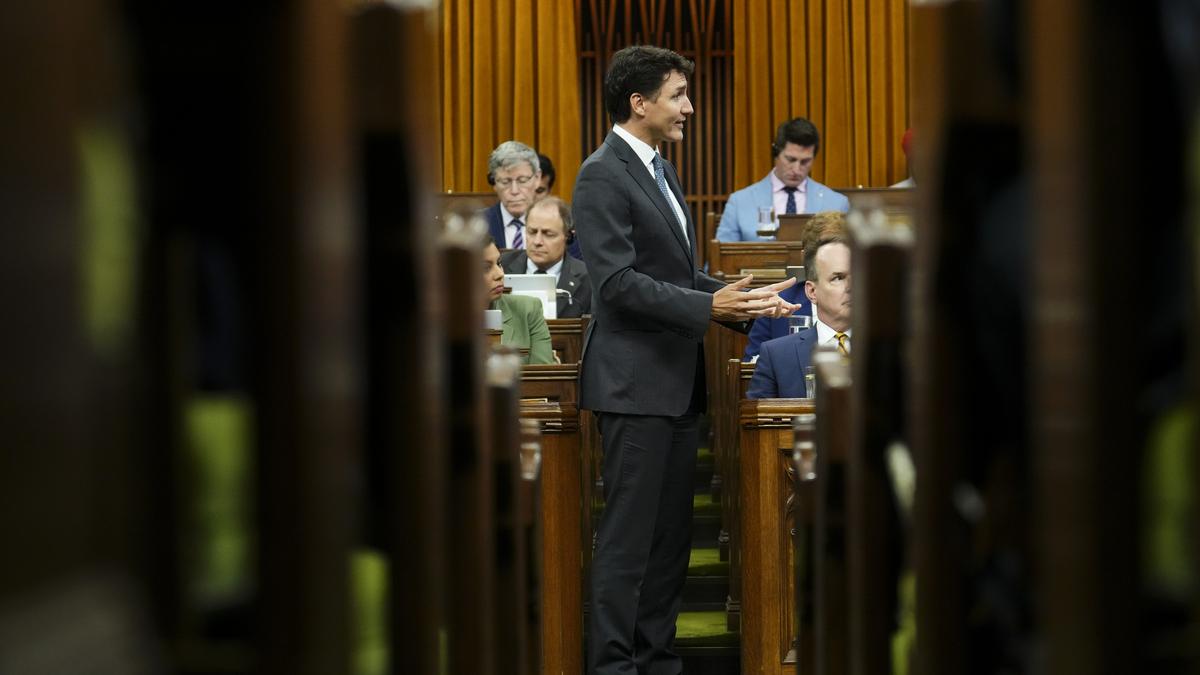Canada Prime Minister Justin Trudeau responds to a question during the question period in the House of Commons on Parliament Hill in Ottawa, Ontario, on June 18, 2024.
| Photo Credit: AP
Canadian parliamentarians stood for a moment of silence to mark one year since the killing of Khalistani separatist and Canadian citizen Hardeep Singh Nijjar on June 18, in a sign that bilateral ties between India and Canada are likely to spiral further downwards, despite a meeting between the two countries’ Prime Ministers, Narendra Modi and Justin Trudeau, in Italy on June 14 .
Khalistani groups were also allowed to take out processions in different Canadian cities, where they shouted anti-India slogans over the killing and called for a trial against Indian officials and Mr. Modi. This came a day after Mr. Trudeau had said that “keeping Canadians safe” — a reference to the Nijjar killing — was a priority in his talks with Mr. Modi.
The Ministry of External Affairs declined to comment on the Canadian parliament’s decision to commemorate the death of Mr. Nijjar, which was taken after an “agreement between representatives of all parties in the House”, according to the Canadian House of Commons Speaker Greg Fergus. Mr. Nijjar was wanted on terror charges by the Indian government, which had placed him on its terror list under the Unlawful Activities (Prevention) Act. New Delhi had also requested Ottawa to extradite him to India.

Kanishka bombing memorial
In what appeared to be a pointed response to the Canadian parliament’s actions, however, the Indian consulate in Vancouver announced on June 19 that a memorial would be held next week to mark the anniversary of the bombing of an Air India Kanishka plane flying the Montreal-Bombay route, carried out by Khalistani separatists in 1985. The attack killed 329 people, including 268 Canadians and 24 Indians. The consulate urged the Indian diaspora to attend.
“India stands at the forefront of countering the menace of terrorism and works closely with all nations to tackle this global threat,” the consulate wrote on its social media handle, asking people of Indian origin in Canada to “join the event in a show of solidarity against terrorism”.
Keeping Canadians safe’
The meeting between Mr. Modi and Mr. Trudeau on the sidelines of the G-7 summit in Italy was the first time the two had come face to face since Mr. Trudeau had, in September 2023, accused Indian “government agents” of being involved in the Nijjar killing and expelled India’s station intelligence chief based in Ottawa. India had responded by cancelling visas, expelling a Canadian diplomat, and ordering the Canadian High Commission’s strength to be reduced by two-thirds. Since then, the Royal Canadian Mounted Police has arrested four Indian nationals, but has yet to announce any evidence connecting them to the government.
After meeting Mr. Modi, who only tweeted a photograph on the exchange with a brief comment, Mr. Trudeau had said that the two Prime Ministers had “committed to work together” to resolve important issues.
India second-biggest foreign threat to Canadian democracy: report
“Now that he [Mr. Modi] is through his election, I think there is an opportunity for us to engage, including on some very serious issues around national security and keeping Canadians safe and the rule of law that we will be engaging,” Mr. Trudeau said in an interview on June 17 , indicating that the Nijjar case continued to be a top priority.
Stark contrasts
While neither New Delhi nor Ottawa commented on the two separate memorial events, the framing of the anniversaries of the Air India bombing, the single worst act of terror in Canada, and the killing of Mr. Nijjar, who was wanted on terror charges in India, highlights the stark contrast between them.
While India has raised the issue of Canada providing safe havens to Khalistani groups accused of terrorism, who are planning to conduct a “referendum” for a separate State in India, Canada has made the issue about Canadian sovereignty and rule of law, accusing India of “interfering” in Canadian affairs. In addition, Canada has contested Indian claims that it has shared no evidence in the Nijjar case thus far, and also denied that it is blocking Indian requests for the extradition of Canadian citizens wanted for terror.

